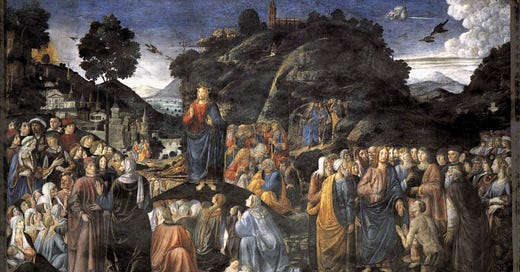Climbing the Mountain of Holiness: St. Leo's Guidance on Living the Beatitudes
In his insightful sermon on the Beatitudes, St. Leo the Great unpacks the meaning behind Christ's blessings on those who are poor in spirit, who mourn, and who are meek. According to St. Leo, the "mourning" Christ refers to is not worldly sorrow, but rather a holy sorrow that comes from contemplating one's own sins and the sins of others. This sadness leads not to despair but to repentance and amendment of life.
St. Leo also explains that meekness is not weakness, but rather patience and willingness to endure injury. The meek will inherit the earth, which signifies entering the kingdom of heaven. As St. Leo beautifully states, through our humility and meekness, our outer self will finally belong fully to our inner self, and we will possess that union in eternal peace.
The central message is that the Beatitudes reveal a paradoxical path to blessedness. Embracing poverty of spirit, sorrow for sin, and meekness in the face of worldly power leads to comfort, mercy, and ultimate inheritance of the kingdom. St. Leo shows how living the Beatitudes helps us grow in holiness and draws us closer to our inheritance as adopted sons and daughters of God. His timeless insights remind us that by emptying ourselves, we make room for God to fill us with His grace and glory.
From a sermon on the Beatitudes by Saint Leo the Great
The blessedness of Christ's kingdom
After pronouncing his blessing on poverty, the Lord added Blessed are those who mourn, for they shall be comforted.
Dearly beloved, this mourning that is promised eternal comfort has nothing in common with the afflictions of this world. No-one is made blessed by the kind of lamentation that the whole human race indulges in. The sighs and blessed tears of the saints have another cause. Holy sorrow comes from contemplating one’s own sins and the sins of others. It does not weep at the actions of divine justice but at the sins committed by human wickedness. It is the one who does evil who is to be pitied here, not the one who suffers it: for what the evil man has done thrusts him down to punishment, while what the just man has put up with leads him up into glory.
Then the Lord added Blessed are the meek, for they shall have the earth for their inheritance. To the meek and gentle, to the lowly and unassuming, to all who are prepared to endure injury – to these the earth is promised. This is not a small or unimportant inheritance, as if “the earth” were somehow distinct from a dwelling-place in heaven: in fact, you must understand it as meaning that only the meek will enter the kingdom of heaven. This earth that is promised to the meek, that is to be given to the gentle to possess, is the body of the saints, whose humility will raise them up and clothe them in the glory of immortality, united at last with the Spirit of unity. Then the outer self will belong to the inner self at last, a peaceful and secure possession.
The meek will possess this inheritance in everlasting peace and their right to it will never grow less. Our present perishable nature must put on imperishability and this mortal nature must put on immortality, so that a danger to the soul becomes a reward and what was onerous becomes an honor.
Let us Pray.
Heavenly Father, may the wisdom of St. Leo's words resonate in our hearts. Help us embrace the paradoxical path of the Beatitudes that leads to blessedness. Give us poverty of spirit to detach from worldly things. Grant us sorrow for our sins that leads to repentance. Instill in us meekness in the face of injury and power. Empty us of pride and self-reliance so that you may fill us with your grace. Transform us into your gentle, humble, and lowly adopted children. Unite our outer and inner selves in your eternal kingdom of peace. We make this prayer through Christ our Lord, who reigns with you and the Holy Spirit as one God forever and ever. Amen.





